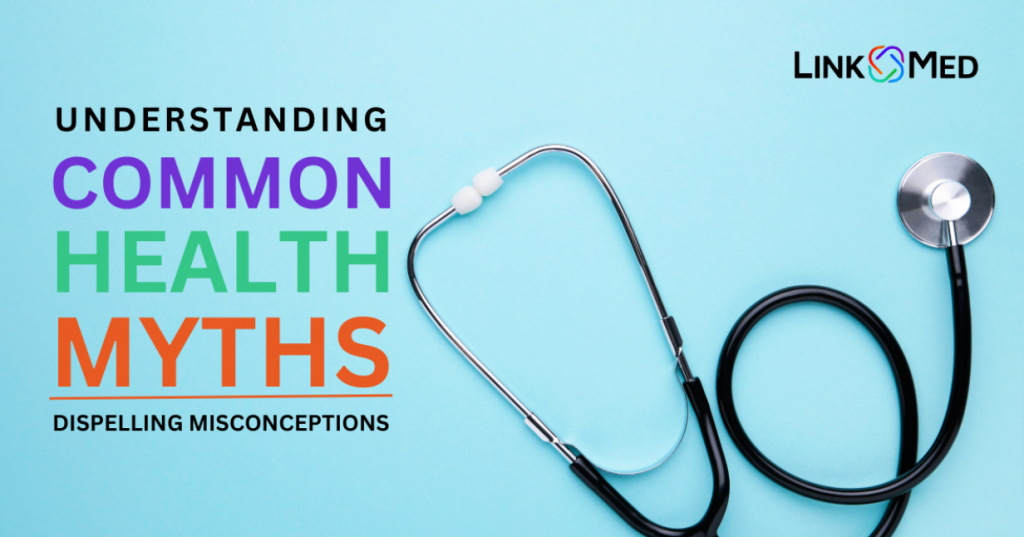Understanding Common Health Myths: Dispelling misconceptions

Understanding Common Health Myths: Dispelling misconceptions
Accurate health information is your body’s best friend. It’s the foundation for making informed decisions about your well-being. When you have correct information, you can take steps to prevent illness, manage chronic conditions, and seek appropriate care.
Imagine trying to navigate a city without a map. You might end up lost, right? The same goes for your health. Reliable information is your guide to staying healthy.
Unfortunately, misinformation spreads like wildfire in today’s world.
With just a few clicks, you can find all sorts of claims about what’s good for you. It can be overwhelming and confusing. That’s why it’s crucial to be a savvy health consumer and to trust credible sources.
Let’s work together to separate fact from fiction.
Myth 1: Carrots Improve Night Vision

You might be surprised to learn that the idea that carrots enhance night vision is actually a clever piece of wartime propaganda! During World War II, the British Air Force was developing advanced radar technology that gave their pilots a significant advantage in night battles.
To keep this secret from the enemy, the British government spread the rumor that their pilots’ exceptional night vision was due to their high consumption of carrots. This clever misinformation campaign was successful in protecting their technological edge.
Scientific Evidence Against the Myth
While carrots are undoubtedly good for you, they don’t magically grant you superhuman night vision. Research has consistently shown that while carrots contain essential nutrients important for overall eye health, they do not specifically enhance vision in low-light conditions.
So, while eating carrots won’t turn you into a night owl, they do offer other valuable benefits.
Real Benefits of Eating Carrots
Carrots are packed with nutrients, making them a fantastic addition to your diet. They are an excellent source of beta-carotene, which your body converts into vitamin A. Vitamin A is crucial for maintaining good vision, especially in low-light conditions. However, it’s important to understand that consuming carrots will prevent night blindness caused by vitamin A deficiency, but it won’t improve the vision of someone who already has sufficient vitamin A intake.
Beyond eye health, carrots are also rich in fiber, which aids digestion, and antioxidants that help protect your cells from damage.
So, while carrots won’t give you supernight vision, they’re still a crunchy and nutritious snack!
Myth 2: Cracking Knuckles Causes Arthritis

Cracking your knuckles leads to arthritis is a classic example of an old wives’ tale that just won’t quit.
How it started is a bit of a mystery, but it’s likely a combination of observation and a bit of superstition. The popping sound might be unsettling to some, and linking it to a serious condition like arthritis could be a way to explain away the discomfort or annoyance.
Over time, this belief has been passed down through generations, becoming a firmly entrenched part of popular wisdom. It’s a myth that’s surprisingly resilient, despite the lack of scientific evidence to support it.
Scientific Studies and Findings
Contrary to popular belief, there’s no scientific link between knuckle cracking and arthritis. Numerous studies have investigated this question, and the results are consistent: cracking your knuckles doesn’t increase your risk of developing arthritis.
The popping sound you hear when you crack your knuckles is actually caused by the release of gas bubbles in the joint fluid. This doesn’t damage the joint in any way.
Effects of Cracking Knuckles
While cracking your knuckles doesn’t cause arthritis, it’s worth noting that excessive knuckle cracking might have some other, less serious side effects. Some people report experiencing temporary stiffness or swelling in their knuckles, but these symptoms are usually mild and short-lived.
There’s also some evidence suggesting that frequent knuckle cracking might lead to a decrease in grip strength over time. However, more research is needed to confirm this.
So, while cracking your knuckles might annoy some people, it’s generally harmless. But if you notice any persistent pain or swelling in your joints, it’s always a good idea to consult a healthcare professional.
Myth 3: You Need to Drink Eight Glasses of Water a Day

We should drink eight glasses of water daily. It has been around for decades, but its exact origin is a bit hazy.
It’s often attributed to a 1945 recommendation from the U.S. Food and Nutrition Board, which suggested an average daily water intake. However, the recommendation was actually for total fluid intake, including water from food and other beverages. Over time, this detail got lost in translation, and the simplified “eight glasses” rule became popular.
Understanding Individual Hydration Needs
The truth is, there’s no one-size-fits-all answer when it comes to water intake. Our hydration needs vary based on several factors, including:
- Climate: People in hot and humid environments generally need more water than those in cooler climates.
- Activity level: Exercise increases fluid loss through sweat, so athletes and physically active individuals require more water.
- Overall health: Certain medical conditions can affect hydration needs.
- Diet: Foods like fruits and vegetables contain a significant amount of water.
Scientific Perspective on Daily Water Intake
Health organizations generally recommend listening to your body’s thirst signals as the best way to stay hydrated. The color of your urine can also be a good indicator. Light yellow urine typically suggests adequate hydration, while dark yellow or amber urine may indicate dehydration.
While the “eight glasses” rule might be a helpful starting point for some, it’s essential to remember that individual needs can vary greatly. It’s always best to focus on overall fluid intake, including water from food and other beverages, and to drink when you’re thirsty.
Myth 4: Antibiotics Can Cure Viral Infections
Differences Between Bacterial and Viral Infections
To understand why antibiotics don’t work on viruses, we need to know a bit about bacteria and viruses.
- Bacteria are single-celled organisms that can cause infections. They’re relatively large and complex compared to viruses.
- Viruses are much smaller and simpler than bacteria. They can only reproduce inside the cells of other living organisms.
Why Antibiotics Don’t Work on Viruses
Antibiotics are specifically designed to kill bacteria. They work by targeting certain structures or processes unique to bacterial cells. Because viruses are fundamentally different from bacteria, antibiotics have no effect on them.
When you have a viral infection, like the common cold or flu, taking antibiotics won’t shorten your illness or prevent complications.
Risks of Antibiotic Misuse
Overusing antibiotics is a serious problem. When antibiotics are used unnecessarily, it can lead to antibiotic resistance. This means that bacteria can develop the ability to survive antibiotic treatment, making infections harder to treat.
Antibiotic resistance is a growing global health crisis. To protect our ability to fight bacterial infections, it’s crucial to use antibiotics only when necessary and to follow the prescribed course of treatment completely.
Myth 5: You Only Use 10% of Your Brain
Humans only use a small fraction of their brain’s potential is a persistent myth, often attributed to the allure of untapped abilities.
While its exact origin is unclear, it likely gained traction in the early 20th century. However, the myth truly exploded in popularity thanks to its portrayal in popular culture.
Movies like Lucy have capitalized on this misconception, presenting fantastical scenarios where characters unlock their full brain potential and acquire extraordinary abilities. This cinematic portrayal has solidified the myth in the public consciousness, making it seem like a plausible reality.
Neuroscientific Research on Brain Usage
Contrary to the popular myth, we use virtually all parts of our brain. Even during sleep, the brain is active, processing information and consolidating memories. Advanced brain imaging techniques like fMRI have allowed scientists to map brain activity during various tasks, revealing that different areas are involved in everything from basic motor functions to complex cognitive processes.
Brain injuries provide further evidence against the 10% myth. Even minor damage to specific brain regions can result in significant impairments, demonstrating that every part of the brain plays a vital role.
Implications of the Myth on Public Perception
The 10% brain myth has had a profound impact on public perception of brain function. It has fueled a belief in untapped potential, leading to the popularity of various self-help and brain training programs that promise to unlock hidden powers. While personal growth and development are valuable, these programs often prey on the misconception that we’re only scratching the surface of our brain’s capabilities.
Moreover, the myth can discourage people from seeking professional help for brain-related issues. If people believe that they’re simply not using their full potential, they might hesitate to consult a doctor for symptoms of cognitive decline or neurological disorders.
It’s essential to dispel this myth and promote accurate information about the brain to foster a better understanding of its complexity and function.
Myth 6: Natural Sugars Are Better Than Processed Sugars
Differences Between Natural and Processed Sugars
The term “natural sugar” might sound healthier, but the truth is that both natural and processed sugars are chemically identical.
They are both forms of sucrose, a combination of glucose and fructose.
- Natural sugars are found in fruits, vegetables, and dairy products. They come packaged with fiber, vitamins, and minerals.
- Processed sugars are extracted from plants like sugarcane or sugar beets and refined. They often have added chemicals to preserve them.
Health Effects of Both Types of Sugars
While there’s no inherent difference between natural and processed sugars on a molecular level, the context in which they are consumed matters.
- Natural sugars are part of a package that includes beneficial nutrients. For example, the sugar in an apple comes with fiber, vitamins, and antioxidants.
- Processed sugars offer empty calories. They contribute to weight gain, increased risk of heart disease, type 2 diabetes, and other health problems when consumed in excess.
It’s important to note that both types of sugars can contribute to weight gain and other health issues if consumed in large quantities.
Dietary Recommendations
The key to a healthy diet is moderation. Here are some guidelines:
- Prioritize whole foods: Focus on fruits, vegetables, whole grains, and lean proteins.
- Limit added sugars: Be mindful of hidden sugars in processed foods and beverages.
- Read food labels: Check for added sugars listed under various names.
- Enjoy treats in moderation: It’s okay to indulge occasionally, but balance it with healthy choices.
Remember, the overall quality of your diet is more important than focusing solely on natural versus processed sugars. A balanced approach that includes a variety of nutrient-dense foods is key to good health.
Myth 7: You Can Catch a Cold from Being Cold
This misconception likely stems from the observation that colds are more common during colder months. People naturally associated the two, assuming that exposure to cold temperatures was the culprit.
How Colds Are Actually Spread
The truth is, colds are caused by viruses, not cold weather. These viruses spread through tiny droplets expelled into the air when an infected person coughs or sneezes. These droplets can then be inhaled by others or land on surfaces where they can survive for a short time. You catch a cold by coming into contact with these virus-laden droplets, not by being cold.
Preventative Measures for Colds
While you can’t control the weather, you can take steps to reduce your risk of catching a cold:
- Frequent handwashing: Wash your hands often with soap and water, especially after being in public places.
- Cover your mouth and nose: When coughing or sneezing, cover your mouth and nose with a tissue or your elbow.
- Avoid close contact: Maintain a safe distance from people who are sick.
- Get vaccinated: The flu vaccine can help protect you from the flu, which shares similar symptoms with the common cold.
- Build your immune system: Eat a healthy diet, get enough sleep, and manage stress to strengthen your body’s defenses.
Myth 8: Detox Diets Cleanse Your Body
Detox diets have become increasingly popular in recent years, fueled by celebrity endorsements, social media trends, and the promise of rapid weight loss and improved health.
These diets often involve restrictive eating plans, juice cleanses, or the use of supplements and herbal remedies.
Your body is a remarkable self-cleaning machine. It has built-in systems to eliminate toxins and waste products. The liver and kidneys are the primary organs responsible for detoxification.
- The liver filters blood, breaking down harmful substances and producing bile to aid in digestion.
- The kidneys remove waste products and excess fluids from the blood, producing urine.
These organs work tirelessly to maintain your body’s balance.
Scientific Critique of Detox Diets
Scientific evidence overwhelmingly supports the idea that the human body is perfectly capable of detoxifying itself without the need for special diets or supplements. Detox diets often lack scientific backing and can be harmful.
- Nutrient deficiencies: Restrictive detox diets can lead to deficiencies in essential nutrients, weakening your immune system and impairing overall health.
- Unrealistic expectations: Detox diets often promise rapid weight loss, which is often unsustainable and can lead to yo-yo dieting.
- Potential for harm: Some detox diets involve extreme measures like fasting or excessive use of laxatives, which can be dangerous.
Instead of relying on fad diets, focus on a balanced diet rich in fruits, vegetables, whole grains, and lean protein. Stay hydrated by drinking plenty of water, and engage in regular physical activity. These healthy habits will support your body’s natural detoxification processes and promote overall well-being.
Myth 9: Fat Is Bad for You
It’s crucial to understand that not all fats are created equal. There are three primary types:
- Saturated fats: Primarily found in animal products like meat, butter, and full-fat dairy.
They can raise LDL (bad) cholesterol levels. - Unsaturated fats: Found in plant-based oils like olive oil, avocados, nuts, and seeds. They can help lower LDL cholesterol and raise HDL (good) cholesterol.
- Trans fats: Created through a process called hydrogenation. They’re often found in processed foods and have been linked to heart disease.
Role of Fats in a Healthy Diet
Fats are essential for various bodily functions:
- Energy source: They provide a concentrated source of energy.
- Nutrient absorption: They help your body absorb vitamins A, D, E, and K.
- Brain health: Essential fatty acids support brain function and development.
- Hormone production: Fats are involved in the production of hormones.
- Cell membrane structure: They are a crucial component of cell membranes.
Misconceptions About Fat and Health
For many years, fat was demonized as the culprit behind heart disease and obesity. However, this oversimplification led to misguided dietary choices.
- All fats are not created equal: As mentioned, unsaturated fats offer health benefits while trans fats should be avoided.
- Fat doesn’t make you fat: Overconsumption of calories, regardless of the source, leads to weight gain.
- Low-fat diets aren’t necessarily healthier: Often, these products are packed with added sugars or unhealthy fats to compensate for the taste.
It’s essential to focus on consuming healthy fats in moderation while limiting saturated and trans fats. A balanced diet that includes a variety of foods is key to good health.
Myth 10: Supplements Can Replace a Healthy Diet
Supplements are exactly that: supplements. They are intended to complement a healthy diet, not replace it. There are specific circumstances where supplements might be beneficial, such as:
- Nutrient deficiencies: If you have a diagnosed deficiency, a supplement might be necessary under medical guidance.
- Specific medical conditions: Some conditions might require supplementation as part of a treatment plan.
- Pregnancy and lactation: Certain nutrients, like folic acid and iron, are crucial during these periods.
However, it’s important to note that even in these cases, supplements should not be seen as a standalone solution.
A diverse and balanced diet is the cornerstone of good health. Whole foods provide a complex array of nutrients, including vitamins, minerals, fiber, antioxidants, and phytonutrients, which work synergistically to support optimal well-being. These nutrients are often present in their most bioavailable forms, meaning your body can easily absorb and utilize them.
No supplement can replicate the complete nutritional package offered by a variety of fresh fruits, vegetables, whole grains, lean proteins, and healthy fats.
Risks of Over-Reliance on Supplements
Relying too heavily on supplements can pose risks:
- Nutrient imbalance: Supplements provide isolated nutrients, which might disrupt the delicate balance required by your body.
- Potential toxicity: Excessive intake of certain vitamins and minerals can be harmful.
- False sense of security: People might neglect their diet, thinking supplements are enough.
- Cost: Supplements can be expensive, and their effectiveness is often questionable.
Always consult with a healthcare professional before starting any new supplement regimen.
Myth 11: You Should Avoid Gluten
Gluten is a protein found in wheat, barley, and rye. It gives bread, pasta, and other baked goods their chewy texture. It’s a common ingredient in many processed foods.
Celiac Disease vs. Gluten Sensitivity
- Celiac disease is an autoimmune disorder where the body’s immune system reacts to gluten. Consuming gluten damages the small intestine.
- Non-celiac gluten sensitivity (NCGS) is a condition where people experience symptoms after consuming gluten, but without the intestinal damage of celiac disease.
- The vast majority of people can consume gluten without any issues.
Misconceptions About Gluten-Free Diets
There’s been a trend towards gluten-free diets, even among people without celiac disease or gluten sensitivity. However, it’s essential to dispel some misconceptions:
- Gluten-free doesn’t automatically equal health: Many gluten-free products are highly processed and high in sugar and unhealthy fats.
- You don’t need to avoid gluten unless diagnosed: Unless you have celiac disease or NCGS, there’s no need to eliminate gluten from your diet.
- Gluten-free diets can be restrictive: Removing entire food groups can make it difficult to get essential nutrients.
If you’re experiencing digestive issues or other symptoms, it’s essential to consult a healthcare professional to determine the underlying cause rather than simply eliminating gluten.
Myth 12: An Apple a Day Keeps the Doctor Away
The charming phrase “an apple a day keeps the doctor away” has been around for centuries, but its exact origin is unclear.
It’s believed to have evolved from a Welsh proverb, and its popularity surged in the early 20th century as a catchy health slogan. While the saying has endured, its literal interpretation is a bit of an oversimplification.
Apples are undoubtedly nutritious and offer several health benefits:
- Fiber: Apples are rich in fiber, aiding digestion and promoting gut health.
- Antioxidants: They contain antioxidants that help protect cells from damage.
- Vitamins and minerals: Apples provide essential vitamins like vitamin C and minerals like potassium.
- Low calorie: They are a low-calorie snack, perfect for weight management.
While apples are a healthy choice, relying solely on one food for your nutritional needs is not ideal. A diverse diet is crucial for optimal health.
- Variety of nutrients: Different foods offer different nutrients. By consuming a variety of fruits, vegetables, whole grains, lean proteins, and healthy fats, you ensure a balanced intake of essential vitamins, minerals, and other nutrients.
- Reduced risk of deficiencies: A varied diet helps prevent nutrient deficiencies that can lead to health problems.
- Taste and enjoyment: A diverse diet offers a wider range of flavors and textures, making meals more enjoyable.
So, while an apple a day can be part of a healthy lifestyle, it’s essential to remember that a balanced diet is the key to long-term well-being.
Myth 13: You Can Spot-Reduce Fat with Exercise
Fat loss is a complex process that involves the breakdown of stored fat for energy.
When you create a calorie deficit (burning more calories than you consume), your body taps into these fat stores. However, the body decides where to draw fat from, not you.
You can specifically target fat loss in a particular area, like your belly or thighs, is a persistent myth. Despite popular belief, doing countless crunches won’t magically eliminate belly fat.
Effective Ways to Lose Fat
While you can’t choose where fat is lost, you can influence overall fat loss. Here are some effective strategies:
- Caloric deficit: Consuming fewer calories than you burn is essential for fat loss.
- Balanced diet: Focus on whole foods, proteins, healthy fats, and complex carbohydrates.
- Regular exercise: Incorporate both cardio and strength training to boost metabolism and build muscle.
- Consistency: Sustainable fat loss takes time. Focus on long-term changes rather than quick fixes.
- Hydration: Drinking enough water supports overall health and can aid in weight management.
Building muscle can help reshape your body and create a more toned appearance, even if it doesn’t directly target specific fat areas. Patience and consistency are key to achieving your goals.
FAQs About Common Health Myths
Does drinking coffee stunt your growth?
This is an old wives’ tale that has been debunked. While excessive caffeine consumption isn’t recommended for children or adolescents, there’s no evidence to suggest that moderate coffee intake hinders growth. Height is primarily determined by genetics and overall nutrition.
Is it bad to eat late at night?
The timing of your meals doesn’t significantly impact weight loss or gain. What matters most is your overall calorie intake. However, eating late at night might disrupt your sleep if you experience indigestion or heartburn. If you’re trying to lose weight, it might be beneficial to have your last meal a few hours before bedtime to allow for proper digestion.
Can you get sick from wet hair?
No, you cannot catch a cold from wet hair. Colds are caused by viruses, not exposure to cold temperatures or dampness. The common misconception likely stems from the fact that cold weather often coincides with cold and flu season.
Are all organic foods healthier?
Organic foods are grown without synthetic pesticides, fertilizers, or genetically modified organisms (GMOs). While this might be beneficial for some people, it doesn’t automatically mean that organic foods are always healthier or more nutritious than conventionally grown ones. The nutritional value of a food depends on many factors, including variety, ripeness, and preparation.
Is it true that microwaves cause cancer?
Microwaves work by agitating water molecules in food, generating heat. There’s no scientific evidence to support the claim that microwaves cause cancer. Modern microwave ovens are safe when used according to manufacturer guidelines.
